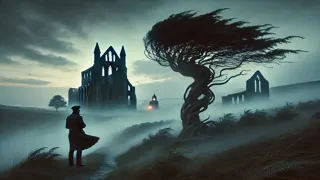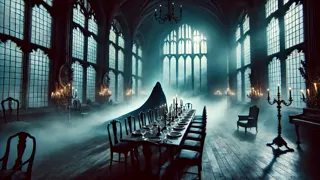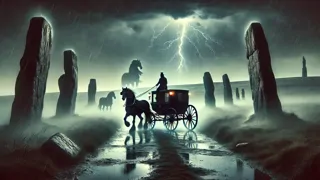Introduction
At twilight, a solitary carriage rocked along the narrow track that wound its way across the Yorkshire moor, barren hills stirring with the uneasy breath of a brewing storm. My master, a man of refined but restless taste, had insisted on pressing forward despite the darkening clouds that gathered overhead like raven wings. From the moment we left Whitby’s lantern-lit quay behind, an unnatural hush clung to the land, as though the world itself held its breath. Every thunderclap reverberated through the low thatch cottages that scattered along the desolate moor, the distant glow of lamplight swallowed by the sudden rush of wind and swirling mist. The coachman, a gaunt figure cloaked against rain, urged the horses with firm words, though I glimpsed tremors in his knotted hands. He spoke little, his face stooped beneath the brim of a battered hat, eyes darting to the gnarled tree line’s silhouette as if expecting something monstrous to lash forth from the shadows. Amid the thunderous heavens, lightning revealed the skeletal framework of ancient standing stones; their silhouettes loomed like silent sentinels bearing witness to a ceremony older than memory. As we closed the distance toward Carfax Abbey—our appointed destination—the flicker of a solitary lamp in the foreboding courtyard offered a slender thread of reassurance. Yet every ray of light seemed controlled and constrained, as though afraid to venture too far from the old walls. A tape of horseshoe nails hissed across damp cobbles, and my heart beat with a steady tension that whispered of things unseen. For while my master slept within the sealed confines of the carriage, I sensed an inexorable design at work, beckoning me forward into a tale of unspeakable dread that would forever alter the course of my journey.
Harbinger on the Moor
As the carriage doors swung open, I stepped onto the sodden earth, the chill of the moor wringing through my overcoat like spectral fingers. The wind’s howl carried a thousand lifetimes of sorrow, stirring the heather into a restless dance of grey-green waves vanishing into the gloom. Each footstep echoed against distant hills that loomed like forlorn ghosts, and I halted by a gnarled yew whose twisted branches bent under the weight of silent omens. Beneath the dirty wash of cloud, the winding track ahead vanished into curling mist, and with every breath I drew the acrid tang of rain and bracken. The horses snorted fretfully, their flanks trembling as if sharing my unspoken dread, and the coachman—a man of few words—gestured toward a faint lantern glow far off, resting like an eye in the darkness. I followed, chest tight with anticipation and foreboding, as if drawn by an invisible thread through the shifting sea of fog.

Beyond the stand of whispering pines, I came upon a shallow pool reflecting the feeble lamp’s flame. Its surface rippled with raindrops, each impact a tiny explosion of silver that faded into the encroaching grey. Here, the air hung so heavily that each inhale felt leaden, as though gravity itself thirsted for my breath. I knelt, watching my reflection waver and fracture in the dark water, until a flicker of movement disturbed the glassy surface. A long, sinuous shape—nothing more than suggestion—passed beneath the water, leaving concentric rings that pulsed toward me like a heartbeat. I rose in alarm, every nerve alive to the moan of unseen wings or the faint patter of hooves against turf. The lamp’s glow beckoned still ahead, stubborn against the bleak horizon, and I forced myself forward, haunted by the certainty that something far older than any man dwelt here upon the land.
The path twisted again, revealing at last the silhouette of Carfax Abbey, half-in ruins, its stones blackened by countless storms and whispered sins. Ivy strangled window arches, and shattered panes reflected no light, like blind eyes staring into the moor’s empty heart. A low wall crumbled beside the carriage way, offering neither welcome nor warning, only silent challenge. I pressed on toward the courtyard, each footfall swallowed by creeping moss and the hush of an unholy calm. Yet even in that mute expanse, I sensed the Abbey’s heartbeat—the tremor of ancient power coursing beneath cold stone, waiting for invitation. Drawn unconsciously to the lamp that burned beyond the archway, I felt something brush at my sanity, a promise of terror that would outlast flesh and bone against the will of dawn.
Echoes at Carfax
The carriage rolled into the courtyard with a clatter that seemed too loud, shattering the moor’s hush like thunder against the stillness. My master awoke with a start, peering through the slit of the carriage window at the looming archway where the lamp cast its trembling light. I offered my hand to steady him as he climbed from the seat, coat tails damp and hair mussed by the wind’s unruly fingers. His calm composure faltered for only a moment when we surveyed the broken stones and the creeping shadows that pooled in every fissure. The coachman called softly, his voice quavering as though the Abbey itself had snatched away his courage, and he led the horses behind us toward a stable arch sealed by rotting doors. I followed my master along the gravel walk where moss stretched like velvet across headstones now half-sunken into the earth. Here, the rain ceased entirely, as if gravity’s tears had run dry, leaving only the faint perfume of wet stone and ancient brimstone.

Ahead, the main doors yawned open, revealing a vaulted hall perfumed by damp and decay. Flickering candle sconces lined the walls, their flames dancing like captive souls hungry for escape. My master moved with deliberate steps through the archway, cloak swirling in his wake, until the heavy oak doors slammed shut behind us. A distant echo of laughter—low and mocking—slithered through the corridors, raising gooseflesh along my spine. The walls dripped with condensation, and every statue’s chipped features seemed accused of some long-silent crime. Candles guttered in vaulted niches, their wax frozen in mid-drip, and a chill seeped through the flagstone floor like a living thing searching for warmth. I lit a lantern and raised it overhead; the feeble glow revealed a grand stair carved of onyx that spiraled into the darkness above.
We ascended toward a dim chamber said to house my master’s strange host, each footfall pounding like a slow drum. At every turn, tapestries bearing crowns and crosses fell away in tatters, their hymns to faith and crown torn by time and neglect. An oppressive hush wrapped around us, pressing down until each breath felt like wading through wool. Then, just before the landing, my master paused, his face a pale mask of wonder and dread. Before him stood an open portrait frame—its canvas missing, as though the portrait had bled away into nothingness. A single chapel bell tolled in the distance, though no tower remained to house such a bell. The peal echoed again, vibrating the air with unearthly fervor, and I realized with a jolt that we had passed no clock in the halls below. Time, it seemed, had been swallowed by the Abbey’s hungry walls, leaving only echoes and shadows to bear witness to our intrusion.
Midnight of the Undead
At the highest chamber, we entered a gothic salon whose lofty windows gaped into the moor like open eyes that had watched the world die. Velvet curtains, black as fresh ruin, hung in heavy folds, half-severed from rotted rods. The single chandelier overhead held extinguished candles, each wick untouched by flame for decades. A long table at the room’s center bore an arrangement of tarnished silver and crystal goblets; their contents long evaporated into oily stains on the oak. My master strode to the head of the table, poised as if to greet a hoard of honored guests. I followed, lantern trembling in my hand, and when we reached the chair at its apex, a sudden chill extinguished all warmth from the room.

From the shadows, steps emerged—soundless, deliberate. A figure draped in a mantle of deepest black glided forward, shape indistinct as smoke, yet unnaturally graceful. There was no candle to reveal a face, only the quiet hiss of silk and the press of presence heavier than any mortal weight. My master did not flinch; instead, he inclined his head in measured deference. "Welcome to Carfax, sir," he intoned in a clear, unwavering voice. The stranger settled into the vacant portrait frame that leaned against the wall, as though drawn by magnetic will. For a heartbeat, nothing moved. Then soft silver lightning from beyond the windows cast the figure’s silhouette—an angular profile framed by webbed hair, slender hands curved like claws. Where human eyes should have been, two points of pale luminescence glowed.
A slow, sonorous voice, like grave dirt sliding on iron rails, filled the chamber. "I have awaited you," it said. The words rippled through the air, stirring dust and dread alike. My lantern flickered and dimmed, but the glow from those otherworldly eyes grew, suffusing the room with an unholy light. Every candle flared then died, plunging us into an obsidian void pierced only by that gaze. I felt my heart slow as if paralyzed by the contemplation of endless night, and only through sheer force did I step forward, lantern raised once more. The stranger rose, the entire world exhaling a breath it had held since creation. When the chamber door slammed shut behind us, the deep toll of the ancient bell called us into darkness. In that final moment, I understood that I was no mere guest: I had become the prey in a game as old as sin itself.
Conclusion
Dawn found me stumbling onto the moor, drenched in dew and terror, the first rays of sunlight burning across a sky still streaked with purples and bruises of the night before. The stones of Carfax Abbey lay silent behind me, their dark towers now distant silhouettes against the pale horizon. I did not speak of what I had witnessed; words would fail beneath the weight of such primeval horror. Instead, I pressed on toward civilization, each fading hoofprint behind me a reminder that some doors, once opened, can never be closed. To this day, I hear the faint echo of that spectral voice, carried on the wind through lonely heather. And every time the breeze whispers down from the moor, I glance over my shoulder, half-expecting to see those luminous eyes waiting at the edge of my vision, inviting me back into the darkness I narrowly escaped.

















